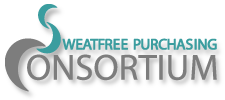Questions About Sweatfree Linkup? Here are Answers.
What is Sweatfree LinkUp?
Sweatfree LinkUp! is a new database of apparel factories, manufacturers, and vendors in the government procurement supply chain. It builds on the pioneering work of several U.S. cities and states that have obtained information about factories that make the uniforms and other apparel they buy. Sweatfree LinkUp! is a tool to collect this supply chain information in a central and accessible place and to promote increased transparency and labor rights accountability in the industry.
Why is it needed?
Sweatshop conditions commonly exist in the global apparel industry. In these situations, workers may be paid poverty wages for long hours of work in unsafe and abusive conditions. These labor abuses can lower production costs, so suppliers that try to do the right thing cannot compete. When public contracts and taxpayer money go to those who cut cost by evading labor standards the public procurement system does not work as it should. Sweatfree LinkUp! offers a way to repair the system by shining a light on the factories that make the apparel governments buy. Ultimately, the database will connect government entities that look for uniforms and other apparel products made in decent working conditions with businesses that provide these products.
What is the source of the information in the database?
Vendors and manufacturers are the sources of the information in Sweatfree LinkUp! Some vendors and manufacturers provide data directly to the Consortium. In other cases, they provide information to government entities that, in turn, provide it to the Consortium.
How reliable are the data?
The Consortium has a high degree of confidence in the information posted in Sweatfree LinkUp! When we receive database submissions we attempt to independently verify the name and location of each entity with the help of import-export databases and other internet tools and by comparing the submission to other submissions from the same source or other sources. When possible we correct inaccuracies before posting the information in the database or delete faulty information. However, it remains the responsibility of vendors and manufacturers to provide full and accurate information either to government entities or directly to the Consortium.
Are all factories in the database “sweatfree”?
The database is a tool for transparency and labor rights accountability, but the Consortium does not verify labor compliance or research working conditions prior to listing any factory in the database. Unless authored by the Consortium, we do not endorse or vouch for the findings of any of the reports listed and provide them as a resource only. Vendors, manufacturers, and public entities do not make any claims about labor compliance to the Consortium when submitting supply chain information. However, in making information public and accessible—information that otherwise may be hidden—they help encourage the scrutiny that helps to improve conditions.
There is an option to filter factory searches for “verified production locations.” What does that mean?
While the Consortium undertakes its best efforts to verify factory names and locations prior to making this information available in the database, it does not mark locations as “verified” unless we have concrete evidence affirming production of specific items in those locations.
Some factories in the database are unionized. Does that mean working conditions are good in those factories?
The existence of a legitimate union is evidence that workers’ right to associate and bargain collectively is respected. When workers have a voice through a union they can negotiate for better wages and benefits, and have a way to safely address abuses or grievances. Unfortunately, illegitimate unions are not uncommon in the global garment industry. These unions do not represent workers' interests and instead hinder the genuine exercise of associational rights by preventing workers from forming and joining unions of their choice. Examples of such fake unions include unions whose leaders are members of management and unions that were formed by management or a government agency. Another indication that a union may be false is if the unions do not seek to bargain for benefits above the legal minimum or concludes a collective contract that does not provide for any benefits above those already provided by law. The existence of this type of union in a factory is not evidence that workers' associational rights are being respected.
When the Consortium receives data about a union, we undertake our best efforts to verify that the union is not illegitimate by researching publicly available sources. Unless we discover evidence to the contrary, the Consortium assumes that a union is legitimate. The Consortium does not, however, endorse or vouch for any union and provides information as a resource only. It remains the responsibility of vendors and manufacturers to only provide information about legitimate unions.
I have information for the database. How can I submit it?
If you are aware of potential labor violations in a factory, please use our online complaint form.
If you would like to provide a new submission for the database please download the submission template.
If you have information or questions about existing data, please contact us.
